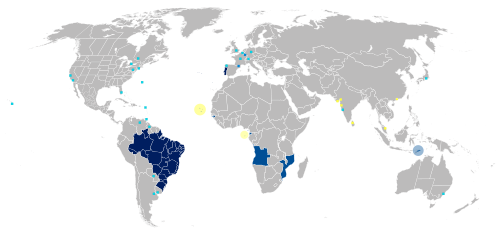Lusitan legal family
Lusitan legal family is a summary term for the legal culture of the Lusophonen , i. H. Portuguese-speaking countries. In addition to Portugal itself, these include Brazil , Cape Verde , Guiné-Bissau , Angola , Sao Tomé and Príncipe, and Mozambique . There are also areas that are influenced by Portuguese law ( Goa , East Timor and Macau ).

* in Macau, Cape Verde, São Tomé and Príncipe, Equatorial Guinea with standard Portuguese as the official language
The concept of a Lusitan legal family was first described in 1982 by Erik Jayme , who also coined the term and founded the German-Lusitan Legal Association (DLJV) in 1991 to research it. The peculiar thing is that both Portuguese law, which in its entirety can only be assigned to one of the recognized legal families with difficulty, in particular because of the independence of Portuguese family, inheritance and international private law, has an impact on the former Portuguese overseas provinces and vice versa, the new legal systems there on the motherland Portugal would have repercussions. The same is now assumed by other authors for civil procedural law and constitutional law.
However, this postulate is not undisputed. In 2008, Moura Vincente denied the independence of a lusophonic legal family. In 2012, however, he then granted a common law in the Portuguese-speaking countries and regions ( comunidade jurídica ), which, however, did not represent a separate Lusitan legal family, but was part of the Roman-Germanic legal tradition. In any case, where the common historical and substantive legal basis is present, there is a Portuguese-speaking legal area . The Community of Portuguese- Speaking Countries (CPLP) has existed since 1996 and has also been cooperating in the legal sector since 2005.
The lusophonic legal system developed through the spread of Portuguese law in the former colonies of Portugal , from where it spread to other areas, such as the law in Macau . In the lusophone states of Africa ( PALOP ), the Portuguese civil code of 1966 (with amendments) in Angola, Guinea-Bissau and Mozambique will continue to apply after independence. Cape Verde, however, replaced the Código Civil (CC) in 1997 with a new civil code. Portuguese law for its part emerged as part of the (continental European) Roman legal system and was heavily influenced by French law until the end of the 19th century and since then by German law.
literature
- Eric Jayme (Ed.): The Law of the Lusophone Countries. Nomos, Baden-Baden 2000
- Carl Friedrich Nordmeier: To the Lusitan legal family . In: Martin Gebauer , Götz Schulze , Heinz-Peter Mansel (eds.): The person in international private law. Liber Amicorum Erik Jayme . Mohr Siebeck, 2019, ISBN 978-3-16-156694-3 , pp. 119 ff .
- José Carlos de Medeiros Nóbrega: The Development of Portuguese Property Law. A systematic overall view with special consideration of the lusophonic rights. Osnabrück University Press, print-on-demand. ISBN 978-3-8471-0217-5
Web links
Individual evidence
- ↑ Objective of the homepage of the German-Lusitan Lawyers Association (DLJV), accessed on February 2, 2020
- ↑ José Carlos de Medeiros Nóbrega: The development of Portuguese property law , p. 37 restricted preview in the Google book search
- ↑ a b c Benjamin Herzog: Application and Interpretation of Law in Portugal and Brazil , p. 31, Mohr Siebeck, 2014, ISBN 978-3161534775 restricted preview in the Google book search
- ↑ Erik Jayme: Considerations on the reform of the Portuguese matrimonial property law , in Festschrift for Imre Zajtay , Tübingen, JCB Mohr (Paul Siebeck), 1982, pp. 262–264
- ↑ Erik Jayme, Christian Schindler: Portuguese - World Language of Law , therein Jayme: Holographic Testaments of Portuguese Citizens in the IPR . ISBN 978-3-8322-2829-3 , p. 60
- ↑ Moura Vincente: Direito Comparado , 1st edition 2008 and 2nd edition 2012, quoted from José Carlos de Medeiros Nóbrega: The development of Portuguese property law , p. 41 limited preview in the Google book search
- ↑ José Carlos de Medeiros Nóbrega: The development of the Portuguese property law , p. 42 restricted preview in the Google book search
- ↑ C. Hertel: Legal circles at a glance Notarius International 2009, p. 157 ff., 162
- ↑ Erik Jayme, Heinz-Peter Mansel (ed.): 100 years of the BGB and the lusophone countries. Symposium in Heidelberg 29. – 30. November 1996. Nomos, Baden-Baden 1997. Reviewed by: v. Bar, DVBl. 1998; Ranieri, Journal of the Savigny Foundation for Legal History 116 (1999), pp. 633–634